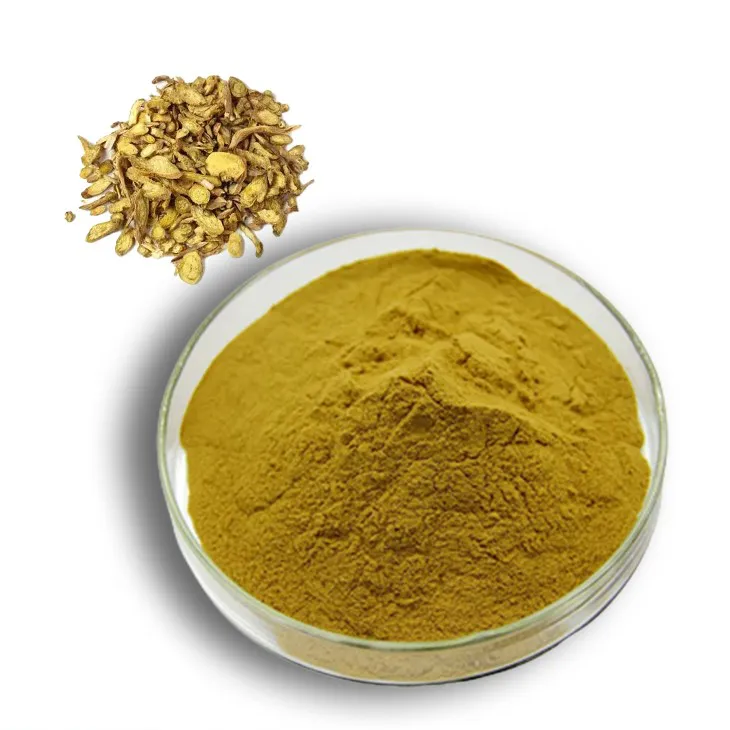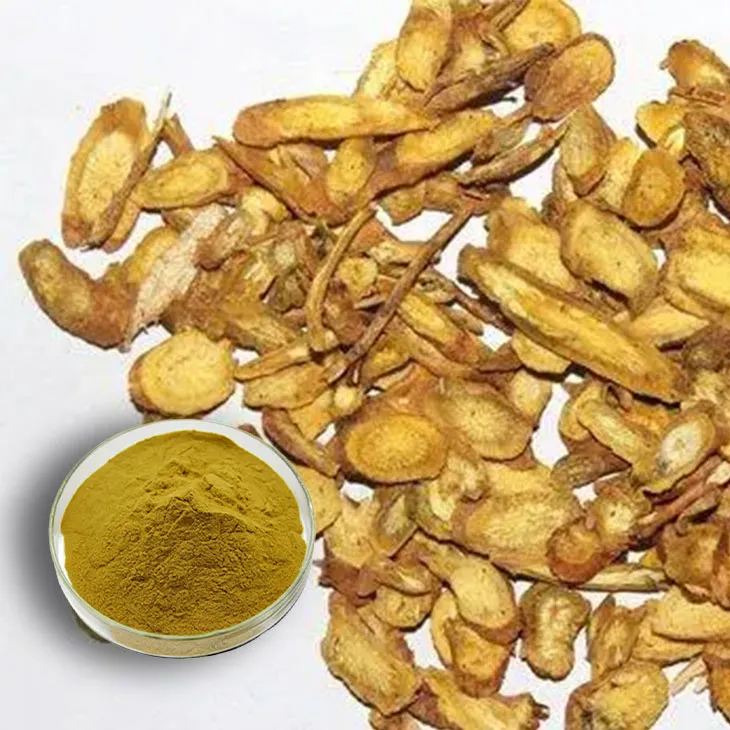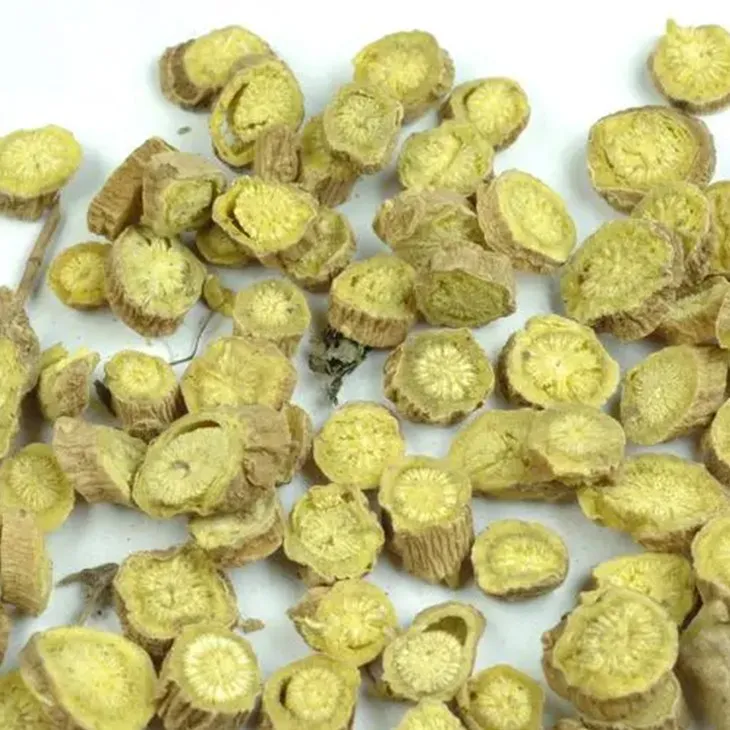- 0086-571-85302990
- sales@greenskybio.com
Have you ever heard of baicalin? Five unexpected health benefits.
2024-11-11

Introduction
Baicalin is a natural compound that has been garnering increasing attention in the field of health and medicine. Derived from the roots of Scutellaria baicalensis Georgi, also known as Chinese skullcap, Baicalin has a long history of use in traditional Chinese medicine. However, modern scientific research is now uncovering a plethora of potential health benefits that were previously not fully understood. In this article, we will explore five unexpected health benefits of Baicalin.

1. Anti - Inflammatory Properties
Baicalin's anti - inflammatory characteristics are one of its most significant features. Inflammation is a natural response of the body's immune system to injury or infection. However, chronic inflammation can lead to a host of health problems, including arthritis, heart disease, and certain types of cancer. Baicalin has been shown to play a role in reducing inflammation - related problems through several mechanisms.
Firstly, it can inhibit the production of pro - inflammatory cytokines. These are small proteins that are secreted by cells of the immune system and play a crucial role in the inflammatory response. By reducing the levels of these cytokines, baicalin helps to dampen the overall inflammatory response in the body.
Secondly, baicalin can modulate the activity of certain enzymes involved in the inflammatory process. For example, it has been shown to inhibit the activity of cyclooxygenase - 2 (COX - 2), an enzyme that is responsible for the production of prostaglandins, which are lipid compounds that contribute to inflammation.
In addition, baicalin can also affect the function of immune cells involved in inflammation. It has been shown to regulate the activity of macrophages, which are white blood cells that play a key role in the immune response and inflammation. By modulating the function of these cells, baicalin can help to maintain a proper balance in the immune system and prevent excessive inflammation.

2. Antioxidant Activity
Another important health benefit of baicalin is its antioxidant function. The body is constantly exposed to free radicals, which are unstable molecules that can cause damage to cells and tissues. Free radicals are generated as a by - product of normal metabolic processes, as well as from external sources such as environmental pollutants, radiation, and certain chemicals. If not neutralized, free radicals can lead to oxidative stress, which has been linked to a wide range of health problems, including aging, neurodegenerative diseases, and cancer.
Baicalin acts as an antioxidant by donating an electron to free radicals, thereby neutralizing them and preventing them from causing damage. It has been shown to be effective against a variety of free radicals, including superoxide anions, hydroxyl radicals, and peroxyl radicals.
Moreover, baicalin can also enhance the activity of the body's own antioxidant defense systems. For example, it has been shown to increase the levels of antioxidant enzymes such as superoxide dismutase (SOD), catalase (CAT), and glutathione peroxidase (GPx). These enzymes play a crucial role in scavenging free radicals and protecting the body from oxidative stress.
In addition to its direct antioxidant effects, baicalin can also protect cells from oxidative damage by modulating various cellular signaling pathways. For example, it has been shown to regulate the activity of nuclear factor - erythroid 2 - related factor 2 (Nrf2), a transcription factor that plays a key role in the regulation of antioxidant and detoxification genes. By activating Nrf2, baicalin can up - regulate the expression of these genes and enhance the body's antioxidant defense capacity.

3. Antimicrobial Effects
Baicalin also exhibits antimicrobial properties, which is another unexpected health benefit. It has the potential to inhibit the growth of some microorganisms, including bacteria, fungi, and viruses.
In terms of antibacterial activity, baicalin has been shown to be effective against a wide range of Gram - positive and Gram - negative bacteria. For example, it has been reported to inhibit the growth of Staphylococcus aureus, Escherichia coli, and Pseudomonas aeruginosa. The antibacterial mechanism of baicalin may involve several aspects. It can disrupt the bacterial cell membrane, leading to leakage of intracellular components and ultimately cell death. Additionally, it can also interfere with bacterial protein synthesis and DNA replication, thereby inhibiting bacterial growth.
Regarding antifungal activity, baicalin has been shown to have an inhibitory effect on certain fungi, such as Candida albicans. It can affect the integrity of the fungal cell wall and membrane, as well as interfere with fungal metabolism, thereby preventing fungal growth and proliferation.
In the context of antiviral activity, baicalin has also shown promise. It has been reported to have an inhibitory effect on viruses such as influenza virus and herpes simplex virus. The antiviral mechanism may involve interfering with viral entry into host cells, as well as inhibiting viral replication once inside the cell.

4. Cardiovascular Health Benefits
Baicalin has potential benefits for cardiovascular health, which is an area of great importance. Cardiovascular diseases are the leading cause of death worldwide, and any compound that can contribute to the prevention or treatment of these diseases is of significant interest.
One way in which baicalin may benefit cardiovascular health is through its anti - inflammatory and antioxidant properties. As mentioned earlier, chronic inflammation and oxidative stress play important roles in the development of cardiovascular diseases. By reducing inflammation and oxidative stress, baicalin can help to protect the blood vessels from damage and prevent the formation of atherosclerotic plaques.
Baicalin can also affect lipid metabolism. It has been shown to reduce the levels of low - density lipoprotein (LDL) cholesterol, also known as "bad" cholesterol, while increasing the levels of high - density lipoprotein (HDL) cholesterol, or "good" cholesterol. This lipid - modulating effect can help to improve the lipid profile in the blood and reduce the risk of cardiovascular diseases.
In addition, baicalin has been shown to have a vasodilatory effect. It can relax the smooth muscle cells in the blood vessel walls, leading to dilation of the blood vessels. This can improve blood flow, reduce blood pressure, and relieve hypertension, which is another important risk factor for cardiovascular diseases.
5. Potential in Anti - Cancer Research
The potential of baicalin in anti - cancer research is also an exciting area. While more research is needed to fully understand its role in cancer prevention and treatment, there are several promising aspects.
One of the mechanisms by which baicalin may have anti - cancer effects is through its ability to induce apoptosis in cancer cells. Apoptosis is a programmed cell death process that is disrupted in cancer cells. Baicalin can activate the apoptotic pathways in cancer cells, leading to their self - destruction.
Baicalin can also inhibit the proliferation of cancer cells. It has been shown to interfere with the cell cycle progression of cancer cells, preventing them from dividing and multiplying. This can slow down the growth of tumors and potentially prevent the spread of cancer.
In addition, baicalin may have anti - angiogenesis properties. Angiogenesis is the process by which new blood vessels are formed, which is necessary for the growth and metastasis of tumors. By inhibiting angiogenesis, baicalin can cut off the blood supply to tumors, starving them of nutrients and oxygen and ultimately inhibiting their growth.
Conclusion
In conclusion, baicalin is a compound with great potential for improving health in multiple ways. Its anti - inflammatory, antioxidant, antimicrobial, cardiovascular - beneficial, and potential anti - cancer properties make it a subject of great interest in the field of health and medicine. However, it is important to note that while the research on baicalin shows promising results, more in - depth studies are needed to fully understand its mechanisms of action and to determine its safety and efficacy in humans. Future research may also focus on developing new formulations and delivery methods of baicalin to maximize its therapeutic potential.
FAQ:
What is Baicalin?
Baicalin is a compound that has various beneficial properties for health. It is often studied for its potential positive impacts on different aspects of the body's functions.
How does Baicalin reduce inflammation?
The anti - inflammatory characteristics of Baicalin are related to its interaction with certain biological processes in the body. It may interfere with the pathways that lead to inflammation, thereby reducing inflammation - related problems, though the exact mechanisms are still being researched.
What makes Baicalin an antioxidant?
Baicalin can act as an antioxidant because it has the ability to neutralize harmful free radicals in the body. Free radicals are unstable molecules that can cause damage to cells, and Baicalin's antioxidant properties help prevent this damage.
Can Baicalin really inhibit the growth of microorganisms?
Yes, in terms of antimicrobial, Baicalin may inhibit the growth of some microorganisms. However, the extent of this inhibition can vary depending on the type of microorganism and the specific conditions. More research is needed to fully understand its antimicrobial capabilities.
What are the potential benefits of Baicalin for cardiovascular health?
Baicalin may have potential benefits for cardiovascular health. It could potentially affect factors such as blood pressure, cholesterol levels, or the function of blood vessels. However, the exact ways in which it benefits cardiovascular health are still being explored.
Related literature
- Baicalin: A Review of Its Pharmacological Properties and Therapeutic Applications"
- "The Antioxidant and Anti - Inflammatory Effects of Baicalin in Health and Disease"
- "Baicalin and Cardiovascular Health: Current Research and Future Perspectives"
- ▶ Hesperidin
- ▶ Citrus Bioflavonoids
- ▶ Plant Extract
- ▶ lycopene
- ▶ Diosmin
- ▶ Grape seed extract
- ▶ Sea buckthorn Juice Powder
- ▶ Fruit Juice Powder
- ▶ Hops Extract
- ▶ Artichoke Extract
- ▶ Mushroom extract
- ▶ Astaxanthin
- ▶ Green Tea Extract
- ▶ Curcumin
- ▶ Horse Chestnut Extract
- ▶ Other Product
- ▶ Boswellia Serrata Extract
- ▶ Resveratrol
- ▶ Marigold Extract
- ▶ Grape Leaf Extract
- ▶ New Product
- ▶ Aminolevulinic acid
- ▶ Cranberry Extract
- ▶ Red Yeast Rice
- ▶ Red Wine Extract
-
Polygonum multiflorum extract
2024-11-11
-
Scutellaria Extract
2024-11-11
-
Sea buckthorn Juice Powder
2024-11-11
-
Calendula Extract
2024-11-11
-
Shikone Extract
2024-11-11
-
Natural grape seed extract
2024-11-11
-
Curcuma Longa Extract/Turmeric extract
2024-11-11
-
Maitake Mushroom Extract
2024-11-11
-
Echinacea Extract
2024-11-11
-
Mulberry Extract
2024-11-11





















